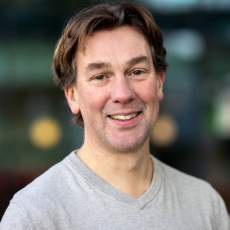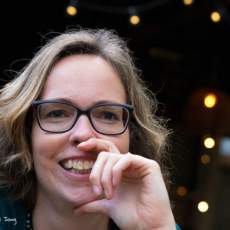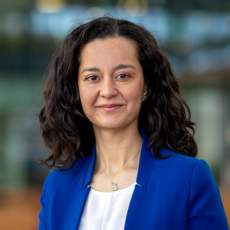Background and justification of the project
Nothing inspires more than hands-on experiencing and debating science and yet, theoretical courses are typically focused on knowledge transfer, and designed in a traditional lecture setup. In the master’s phase it is more common to supply students with hands-on experiences and the opportunity to apply their knowledge. However, to setup a bachelor course in this way is a big challenge, because of the large number of students (more than 150). Nevertheless to activate and motivate students it is essential to embed hands-on (practical) experiences in a course and create situations where students are challenged to discuss about what they have learned.
The Applied Cell Biology course will be designed as described above. It will comprise both knowledge transfer and the application of this knowledge in a relevant biomedical topic. Because data science is increasingly important within the biomedical engineering field, students in this course learn how to collect, analyze and interpret data in hands-on sessions. In addition, attention is payed to learning how to form an opinion by using scientific sources (literature, data) and students will need to use these skills in a debating setting. The combination of these different types of education will together form a powerful learning environment.
Objectives and expected outcomes
In biomedical engineering research students need to master three skills. Firstly, students have to obtain the knowledge to understand the problem. This type of knowledge can be found in text books and via already available online videos and studying these can be an individual learning activity. Secondly, the students need to be able to assess the value of scientific literature describing recently executed cell experiments and their results. Studying these scientific sources is best performed by discussing papers in groups, so that students stimulate each other and learn to form on opinion. The third skill that students need, is that on one hand they can translate a research question to an experimental setup, and on the other hand the experimental results to knowledge.
The objective of the project is to design and implement a course on Applied Cell Biology, in which the student is challenged to span the gap between experimentally acquired data and building on solutions for biomedical problems.
The course should provide a pro-activate learning environment for students using
- Self-guided online learning
- Supervised literature discussions
- Lab-based experimenting
- Debating
The backbone of the course will be a cell biological challenge from the clinical practice, for example the fibrotic response to implanted biomaterials. In scientific literature many hypotheses can be found about the mechanisms behind the fibrotic response, however the actual cause is not yet know. Students learn to work on such a biomedical challenge by combining theoretical and experimental knowledge and by forming an opinion about scientific literature on this topic.
Basic (textbook) knowledge will for the given example consist of the molecular mechanisms of cell adhesion and the triggered signaling pathways. In experiments the reaction of the cells to biomaterial will be measured and quantified. Performing the experiments gives the students insight in analytical techniques and teaches them how to value experiments described by others. The textbook knowledge and experimental experience then gives them the necessary background to read and interpreted the scientific literature. Supervised discussion learns them to form and substantiate opinions on the hypotheses formulated in literature. Eventually in a debating setting students will be challenged to use the obtained knowledge and demonstrate their skills by debating on propositions related to the clinical questions.
The course will offer a mix of guided and self-regulated studying methods. Students are expected to study textbook knowledge mostly independently, supported by different resources (books, articles, web lectures). This makes it possible to organize hands-on activities for a large number of students (approx. 150 students). These experiments will trigger the natural curiosity of the students and motivate the students. The debating component of the course ensures that students gain the relevant knowledge and develop valuable scientific skills on reasoning and reflecting.
Project design and management
The project is setup according to 6 steps to blended learning approach:
Timeline
Step 1 – Intake and analysis (December - January 2019)
First discussions on the set-up of the course have resulted in this proposal
Step 2 – Experimenting (February – March 2019)
Several IT tools will be studied to assess how they can be applied in this course. Currently we are considering Lab Buddy, web lectures and feedback tools to stimulate self-study. All tools will be made available through Canvas.
Step 3 – Design (April 2019 – August 2019)
Starting point will be the learning objectives of this course. These will be used as framework to define the textbook theory that should be studied, the experiments and the hypotheses that are addressed in the discussions. In this phase most effort will be put in the setup of the learning activities, the experiments in particular, as it will be challenging to give 150 students a valuable hand-on experience. Efforts needs to be put into finding the correct cell lines and (bio)materials. It probably also will take time to develop cell staining protocols and analysis techniques, that are doable in a large group, but still give good correct results.
Also, the outline for the web lectures will be made. Ample material is already available online, and this will be used as much as possible.
The debating session will be put together in collaboration with Het debatbureau, who will coordinate the formation of teaching material, lectures, evaluation and all other things needed to run the debates. They will also train the teacher, so that he can take over this part in the following year.
Step 4 - Production (August – October 2019)
In this phase the tools, web lectures and Canvas site of the course will be recorded and setup such that individual students are supported in their self-study activities and that the discussion groups can use Canvas to exchange their material.
Stap 5 – Execution (November – January 2020)
The course on Applied Cell Biology is scheduled to run in Q2 of academic year 2019-2020.
Stap 6 – Evaluation and iteration (January – April 2020)
Evaluation of the course will take place by both asking for feedback during the course (student panel) and by a course evaluation. We would like to add this phase to the project as we think that it is most effective to immediately use the feedback to improve the course.
Dissemination and sustainability of the project
The project will result in a course that is designed in such a way that the teacher will be able to run this course by himself with some help of student assistants. The digital learning environment is setup, but probably requires some maintenance that can be done by a student assistant. Experiments are set-up and experimental protocols are developed and these can thus be executed by student assistants. In addition, the teacher is trained by Het Debatbureau, so that he is able to lead the debating sessions in the coming years.
Experiences with the setup of this course and the development of hands-on practical session for a large group of students will be shared with colleagues both within and outside of the department, e.g. in a good practice session during the education day of the department or during educational lunches. We foresee that many teachers will be interested as scaling of practicals is an issue in other courses in our department as well that becomes more urgent now a growing number of students enter the master’s phase.
Results and learnings
This project is still ongoing.


